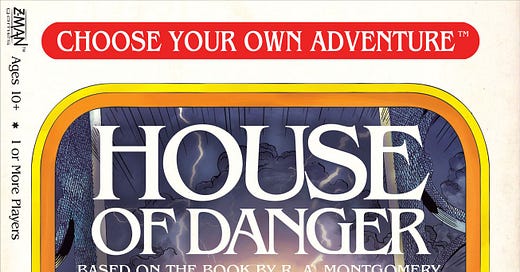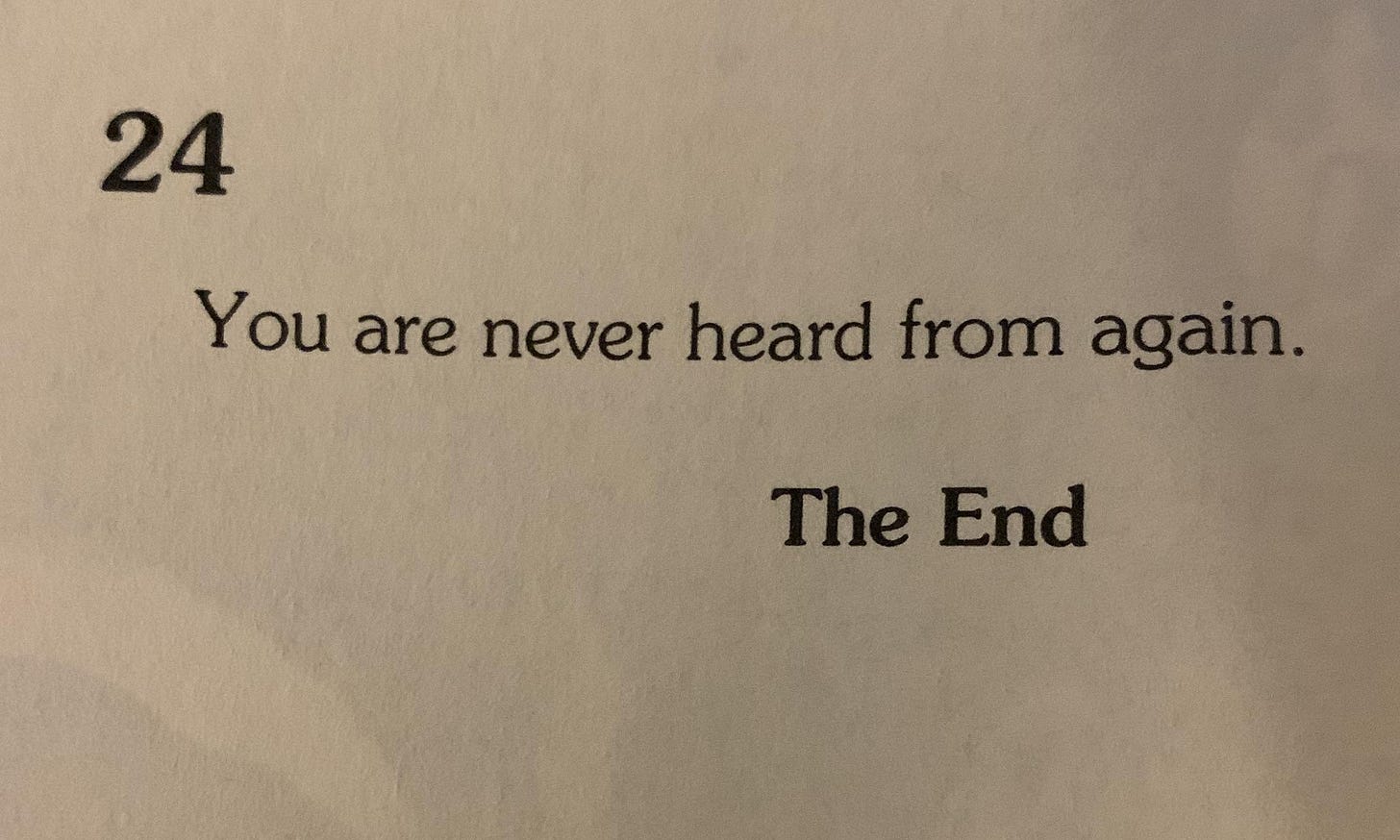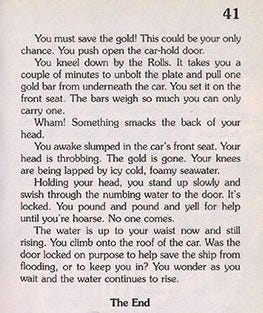Okay, so now you see it. The whole rigged game, clear as day. You understand why your brilliant suggestions vanish into thin air, why the same broken patterns keep repeating, why everyone seems to know things are messed up but nothing ever changes.
Great. You're awake now.
But you know still have to show up tomorrow. You still have to sit through those meetings where everyone pretends the emperor has clothes. You still have to get your work done inside this system that you now realize is designed to protect itself, even when things don’t make sense.
So what the hell do you do with that?
I've been wrestling with this question for years, and I don't pretend to have it all figured out. But I can tell you what I've learned from my own stumbling around in this realization. Because understanding the problem is just step one. Just like those great Choose Your Own Adventure books, you need to pick a path forward.
Here's how I see it: You've got about three choices in front of you.
Four, if you add in putting in your notice and burning down the building, but I don’t advise that. Unless you’ve just won the lottery, in which case I’d like to remind you about what good friends we are and how much I love sailing on yachts.
Let’s turn the page to see how they play out.
Page 24: If you’re going down, you’re going down swinging.
This is where you decide to call it all out. Every stupid meeting, every bad decision, every obvious thing that is royally messed up - you name it. You become the person who won't play along anymore, who wheels out the flaming dumpster and makes sure everyone can see it’s on fire.
And you know what? For a hot minute, it will feel amazing. You will feel a release of something you didn’t even realize you were holding in. You’re finally saying what everyone has been thinking. People will look at you with a mix of admiration and fear, because while they may appreciate the candor, they also know what’s coming next and they don’t want to get burned by association.
You're basically lighting yourself on fire to provide light for everyone else.
And you know that the system doesn't reward truth-tellers, no matter what someone might say in the moment, and no matter what inspirational words are painted on the walls. In no short order, you’ll find yourself labeled perhaps as "difficult", or the person who "doesn't get how things work around here," and likely the one who "creates unnecessary drama."
I've watched good people take this path. Really good people who just couldn't stomach it anymore. (I remember one amazing meeting where one of the attorneys at a former company literally scorched the earth. I knew it would be good when she started with “If I say this, today is probably my last day, and I don’t care”. It was amazing to watch, and also it led to absolutely nothing changed).
When you burn loud and bright, the system will douse your spark quickly. And six months later, it will be like you never existed. All the issues you raised will be quietly ignored and forgotten. Because like a casino, the system always wins.
Page 41: See no evil, hear no evil, speak no evil
This is the opposite extreme. You see all the mess, but like a procrastinator staring at a to-do list, you just decide to ignore it. Keep quiet, do your job, hope things somehow magically improve on their own.
I get why people choose this. It feels safer. Less risky. And it has the added bonus that you get to tell yourself you're being practical, mature, picking your battles, even as you wade through the unfair, and the illogical and the incomprehensible.
But here's what actually happens: you slowly suffocate.
Every time you bite your tongue when you should speak up.
Every time you co-sign on a decision that you know in your bones is not the right one, but that would require a huge store of energy to course correct.
Every time you come across a problem that you could solve, but choose not to so you don’t rock the boat.
Each of these decisions will eat away at you, piece by piece.
And here’s the rub. Even though you’ve kept your head down, and out of the line of fire, you’re not actually safe. When the shit hits the fan (and it almost always does in some fashion), being invisible doesn’t protect you.
However, it does mean that you now have zero influence over what happens to you next.
I’ve been in plenty of roles where I just followed marching orders, and still had to deal with the fallout of someone else’s poor decision or work. When I was in my early 20s, I was part of two different sales teams that got laid off - the first time was because of a leader’s forecasting error. The second time was because my boss’ boss had pissed someone off who was higher up the food chain.
No one really cared that I, or the ten or so other people losing their jobs, had nothing to do with it. Was I really just a random name on a page, an employee number in an Excel cell waiting to be deleted?
Page 40: Learn to make a broken system work for you.
This is the path I wish someone had explained to me years ago. And no, it's not about becoming some slimy office politician or suck-up. It's about understanding that the system runs on its own twisted logic - and you can use that logic without selling your soul.
Think of it like this: You're not trying to swim upstream anymore. You're learning to navigate the current while still heading where you want to go.
Here's what that actually looks like:
Stop trying to convince people with moral arguments.
I know, I know - the right thing to do should be enough. But it's not. When you have a good idea, frame it in terms of what the person you're talking to actually cares about.
Your boss worried about her numbers? Show her how your idea makes her look like a rockstar. Department head obsessed with avoiding risk? Position your solution as insurance against bigger problems down the road. Your idea is still the right thing to do. You're not lying. You're translating.
Be the person who makes other people's jobs easier, not harder.
This sounds so obvious that you might want to yell at your screen. But stay with me. Take a minute to think about the person (or people) at work who just make everything harder than it needs to be - whether deliberately or through ignorance, negligence or just dumb luck, working with them is like running uphill backwards. You eventually get there, but boy are you tired.
Don’t be that person. Build a reputation for solving problems, not creating them. Take on the small things, and smooth them out. Come prepared. Follow up without being asked. Anticipate the stupid questions and have answers ready. When you make someone's life simpler, they want to keep you around. The system rewards people who reduce friction for those in power.
Document the important stuff, but don't be weird about it.
Send those "just to confirm our conversation" emails, but keep the tone light so people don’t feel like you’re building a federal case. Keep track of who decided what and when. When everything inevitably goes sideways, you want facts, not just fading memories. This will help you avoid becoming too emotional, because you can anchor yourself in cold, hard facts. Let your records be your protection. An added bonus is that many people are often forgetful, and being the person who knows the details increases your value.
Find your people.
You're not the only one who sees through the bullshit. Look for the others - they're the ones with that same slightly shell-shocked look when another obviously terrible decision gets made. Build real relationships with them. Share information. Have each other's backs.
But, caution, choose wisely. Sometimes you might think you’ve found someone who gets it, but instead you’ve found a gossip, or the habitual complainer, or (worst of all) the corporate Janus, who revels in showing one face to soak up all the frustration, and another when they freely use this knowledge as leverage with leadership to cement their position. I’ve been deceived by someone like this, and embarrassingly not just once. But after the second time, I’d figured it out.
Listen long enough and the gossip will spend most of their time talking about people, not problems. The habitual complainer can find something wrong with a cloudless sunny day in June. And the Janus? They’re slippery, but you can usually spot them by the way they are almost too interested in what you have to share. Nobody is that fascinated by office frustrations, trust me. Watch for the person who comes around a bit too much, and leans in a bit too far when things go sideways.
Pick your battles like your career depends on it, because it does.
Not every dumb thing is worth fighting about. This took me forever to figure out, and I still haven’t cracked it, but it does make a big difference. Save your credibility (and energy) for the stuff that really matters. Let the small stupidities slide so you have ammunition when it counts.
Know your lines and hold them.
Figure out what you absolutely will not do, and don't budge on those things. Maybe you won't throw a colleague under the bus. Maybe you won't lie to customers. Whatever your non-negotiables are, be crystal clear about them - to yourself, if not to anyone else.
Look, this isn't always comfortable. There will be days when you feel like you're compromising too much, when the gap between who you are and what you're doing feels too wide. You'll wonder if you're becoming part of the problem.
I know I certainly have felt like that more than once.
But here's what I've figured out: You can't change a system you don't understand, and you can't influence a game you refuse to learn how to play. Understanding the rules doesn't mean you like them. Playing strategically doesn't mean you've lost yourself.
Sometimes working within the system's own warped logic is exactly how you create space to do something that actually matters.
The system isn't going anywhere. But that doesn't mean you're powerless inside it.
Now, before you think I'm painting this as some kind of easy solution, let me be clear: This path comes with its own burden. There's a weight to understanding how broken everything is while still showing up every day to participate in it.
Next time, I want to talk about that weight. What it feels like to carry it, and why it might be worth it anyway.
But that's for another day.






